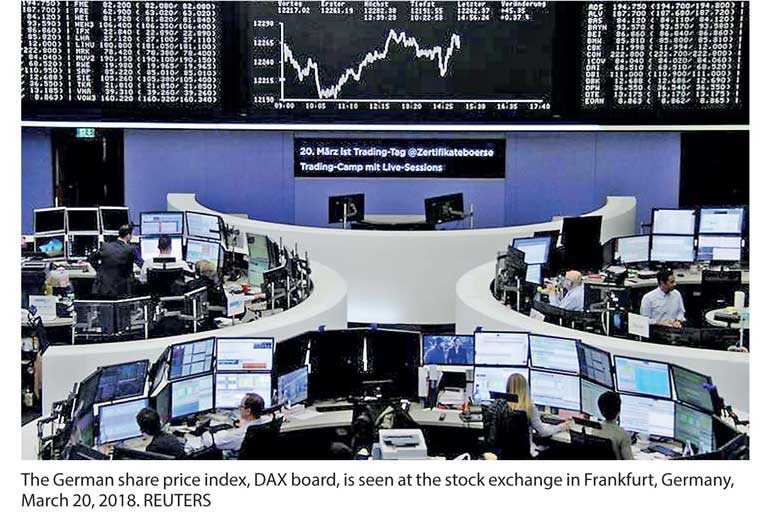Friday Feb 20, 2026
Friday Feb 20, 2026
Friday, 8 June 2018 00:00 - - {{hitsCtrl.values.hits}}

London (Reuters): World stocks hit a three-week high on Thursday and the euro and German Bund yields also rose as investors priced in a potentially earlier-than-expected wind-down of stimulus from the European Central Bank.
The selloff in safe-haven Bunds drove money into riskier assets, especially financial stocks, despite investors’ anxiety over how a G7 leaders summit that kicks off on Friday will pan out in view of global trade concerns.
Bank stocks, which tend to gain from higher bond yields, drove European shares up in early trade. The pan-European banks index jumped 1.4%, helping the STOXX 600 gain 0.5%.
Banks remain the worst-performing sector in Europe year-to-date, however, having been dented by a selloff triggered by political risk in Italy.
MSCI’s index of world stocks rose 0.3% to its highest since 14 May, helped by Asian shares which climbed to an 11-week high overnight.
The euro and Germany’s benchmark 10-year bond both climbed on signs that the ECB could soon call an end to its stimulus program.
The bank’s Chief Economist Peter Praet said on Wednesday that robust growth made it increasingly confident that inflation was on its way back to target, raising chances it may reveal more about the end of the bond-buying program at its meeting next week.
Praet’s comments took the market by surprise, given a recent slowdown in the euro zone economy.
The euro hit its highest level since 15 May at $ 1.1838, and traded up 0.4% at $ 1.1824 by 0920 GMT. The common currency’s rise helped drive the dollar index down 0.3% to 93.399.
German Bund yields rose above 0.50% for the first time in two weeks. The 10-year US Treasury yield moderated its rise slightly, having hit a 1-1/2-week peak of 2.985% on Wednesday.
Data on Thursday showed German industrial orders plunged unexpectedly in April, a fourth consecutive monthly drop.
“It’s a complex backdrop where ultimately the economy is not doing badly, but the economic surprises in Europe have not been to the upside,” said Antoine Lesne, head of EMEA strategy and research at State Street’s SPDR ETF.
“Bad momentum has eased the overall backdrop the ECB is navigating - but if you’re looking at the broader macro picture it is still positive for risk assets.”
Political risk
The risk-on moves across markets coincided with a calendar of potentially destabilising political events.
The run-up to the G7 summit has been dominated by a widening divide over trade between US President Trump and the club’s remaining six members.
But gauges of investor anxiety, including stock volatility, showed no signs of strain.
The VIX, which measures volatility on the S&P 500, was last trading flat at 11.64. It has fallen from more than 50 to less than 12 in just 83 days - a record decline, traders said.
“It’s a surprise to say the least that it’s coming back down so quickly,” said SPDR ETF’s Lesne.
Investors chose to focus instead on a still supportive global economy which was fuelling demand for commodities.
Oil prices rose, shaking off some of the previous session’s losses as plunging exports from OPEC member Venezuela crimped supply in the market.
Brent crude futures traded up 0.4% at $ 75.65 a barrel and US West Texas Intermediate (WTI) crude up 0.3% at $ 64.92.
Copper hit its highest level this year at $ 7,295 per ton, driven by supply concerns over disruption at the Escondida mine in Chile. It was on track for its sixth straight day of gains, its longest run since December.
Gold prices edged higher, with spot gold trading at $ 1,297 per ounce, up 0.2%.
In emerging markets, stocks climbed 0.5% to a three-week high, supported by the weaker dollar.